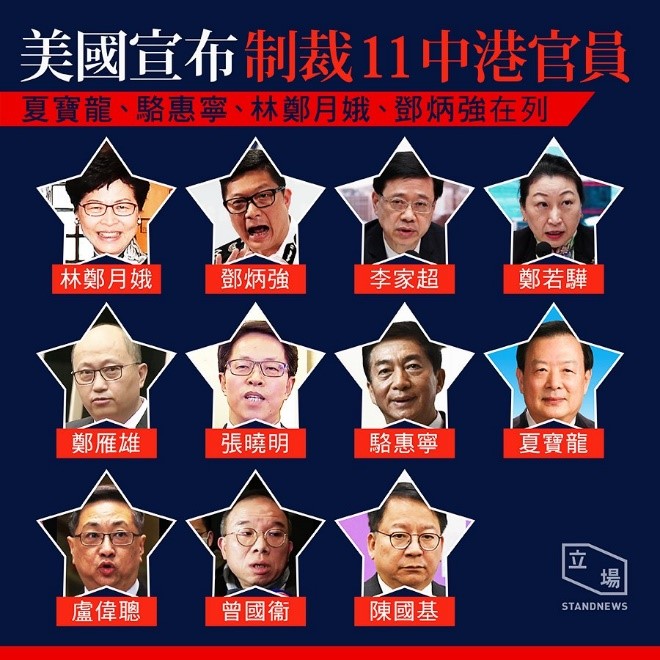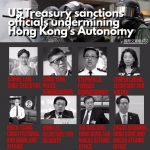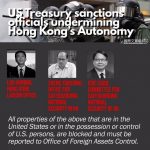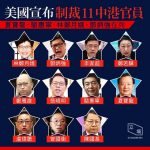
“Isn’t such a ‘sanction’ in vain as I don’t have any assets abroad? Of course, I can also send US$100 to Mr Trump for freezing.”
Luo Huining, Director of the PRC Liaison Office in Hong Kong
This was the dismissive response of Luo Huining after the announcement of US Government sanctions on him and 10 other Hong Kong and PRC officials seen as primarily responsible for the National Security Law and clamping down of democratic and political freedoms in Hong Kong. Whether he or is family have squirrelled away assets overseas nobody knows but he makes a strong point. What effect can these sanctions have if there is no direction impact on any of the eleven targets?
The Hong Kong sanctions and earlier sanctions on Chinese officials and entities operating in Xinjiang are just part of the ongoing Trump full court press on China. Can the imposition of financial sanctions really make a difference in the current showdown? What is hoped for by such measures?
You don’t want to be sanctioned
The 11 targeted officials are well known and key figures for anyone following events in Hong Kong. Top of the list is of course Chief Executive Carrie Lam, followed by Police chief Chris Tang, Justice Secretary Teresa Cheng along with PRC officials overseeing Hong Kong affairs, a full list is shown below. The sanctions will freeze any assets in the US and stop US firms dealing with the individuals, it will restrict travel although that hardly seems to matter in a world locked down by pandemic. From a practical standpoint US banks and companies operating in Hong Kong will ensure that they do not have accounts with any of these individuals and firms such as Facebook or Amazon or Apple should ensure they have no direct payment or interaction with them. Luo may mock the moves but there are serious implications. And there are certainly serious implication for firms which breach the sanctions. The US banking regulators have a imposed a string of fines and penalties on firms which have breached US financial sanctions. Any dollar denominated transaction ultimately gets cleared through a US domestic bank and that gives the hook into any firm which deals with a sanctioned individual.
Has the full impact been felt by these individuals yet? Probably not but firms across Hong Kong will be reviewing business links to see if they are in danger of breaching the sanctions. Over the past decade or so financial regulators globally have spent consider time and effort clamping down on tax evasion, corruption and bribery. That has led to much higher levels of bank and financial sector due diligence and oversight when it comes to PEP, Politically Exposed Persons, and transactions from certain high-risk countries where the level of financial regulatory supervision is seen to be lacking. These 11 officials will all be prominent on the sanctions lists and for many companies in Hong Kong they simply won’t want anything to do with them or their families. The risk of incurring the US wrath is just too great.
Luo Huining, and the other PRC officials if they have bank accounts in Hong Kong will be with a Mainland bank, their passports won’t even be in their possession as they will be kept by the Party personal department to ensure they don’t depart on short notice or travel anywhere without approval . For the Hong Kong officials their monthly salaries aren’t going anywhere near Citi or JP Morgan although they likely use local banks already but they will certainly be doing so now.
This though is only a part of the ongoing re-ordering of banking arrangements in Hong Kong. It was recently announced that the Hong Kong Police Credit Union have been systematically transferring money from foreign banks since May. The Union has not been sanctioned but it very much fits the pattern of financial realignment which is occurring in Hong Kong. This column has previously noted that anyone concerned by the new security law should not leave any excess funds in Hong Kong and the Credit Union is effectively acting on the same advice. Its concern is not that it will be targeted by the PRC but that it could come under foreign sanction hence the move to the safety of PRC banks. It is worth noting that Hong Kong’s biggest bank HSBC is technically a foreign banking group as its global domicile is the UK.
The 11 HK & PRC Officials under US financial sanction
Source: Telegram Channels/Stand News
More sanctions to come but what will change?
The financial sanctions against the Hong Kong 11 are only the latest in the Trump full court press on China. The trade war tariffs seem such a long time ago but of course they were the start of the broad Trump push against China. The recent financial sanctions could be seen as part of the capital war front which Trump, and others had already opened up by targeting Chinese companies listed on US exchanges. It is the dominant position of the US dollar within global capital flows which gives the US so much clout with respect to financial sanctions. Global banks may look to China for expansion and growth, but they simply cannot cut themselves off from US capital flows and look solely to China. The US really does have leverage in this sphere.
Trump though continues to expand possible restrictions on China across almost all fields. He has targeted academics and students, he has floated an idea of barring all Communist Party members from the US, he is currently targeting Tiktok the video sharing app and further increased sanctions against Huawei. There does not seem to be any area which he rules out of bounds. Is this a part of a coherent China plan or just an election strategy to act tough on China? Frankly who knows. The complaint from these columns has been the uncoordinated way in which the US administration has pursued China. When many of its allies and natural democratic partners have shared the same concerns as the US the unwillingness to act in a coordinate fashion has certainly limited the impact upon China. While some commentators and senior figures within China are no doubt concerned about the path that Xi Jinping is taking China on the global stage, the scattergun approach of Trump has resulted in few if any concessions from China. The sole accommodation from China has been the Phase One trade deal which did little to address any substantial issues in the relationship and its terms are almost certainly not going to be met in this economically depressed Covid world.
There is no reason to think there will not be more sanctions, financial or otherwise on China. Much effort has been focused on Chinese companies’ listings in the US but the real fear for the Chinese government must be restrictions on US capital investing in Chinese companies. That could target not only portfolio flows but also private equity investments in Chinese unlisted companies and investment in PRC joint ventures. That would put China on par with Iran or North Korea and would see literally trillions of dollars looking to divest from China in one way or another. That seems even a step too far from Trump but who would dare rule out any move in the world we live in? Such dramatic and costly actions though could happen because the previous landscape of economic engagement is simply no longer there. The dislocations from Covid19 are not going away anytime soon, travel disruptions are most probably in place for at least another year or so. Lives and businesses cannot just be put on hold or frozen but need to adapt and change because of that. The EU Chamber of Commerce estimates that perhaps 250,000 foreign business men and women are shut out of China because of travel restrictions, that is already having a negative impact on operations and a good portion of those people will never go back, or if they do it is under very different circumstances. The intersection of the pandemic and the US-China disengagement means that a significant break is almost inevitable regardless of the outcome of the US election in November.
But will sanctions, tariffs, technology bans really have an impact in changing China’s behavior in Xinjiang or Hong Kong or even towards its majority Han population when it comes to freedom of speech or political rights? What is the hoped-for change? Economic or political or both? There is no reason to believe at all the Hong Kong 11 will change the course of events in Hong Kong. Indeed, the sanctions will only make them cleave more closely to the central government in Beijing. There will be some degree of inconvenience via the sanctions, but Hong Kong’s political direction isn’t being reversed because of recent actions. Such limited impact is also true when it comes to Xinjiang. The entities and individuals involved are too integrated into the Chinese system to be affected by the US moves. It is encouraging that at last there is an awareness of the nature of the Party and a willingness to act against individuals and firms, but no one can expect quick results. North Korea, Iran, Russia and Venezuela have all been under some level of US or global sanctions for many years and while some actions have been modified the authoritarian systems remain stubbornly in place even as severe economic dislocations grow. North Korea remains a nuclear power threatening its neighbors, Iran’s clerics have been in power for over 40 years, Russia shows no indication of leaving the Crimea and the long suffering Venezuelan people have endured tremendous economic hardship and hyperinflation yet remain burdened with the failed policies of Maduro chasing some communist utopia.
What hope then for sanctions working with China? China’s economy and global clout is far greater than any of those other countries. It is highly organized and controlled with a domestic security budget greater than its external defense budget. Sanctions and restrictions on Chinese officials and companies are welcome and needed but they will only have a limited effect and will in some cases hasten China’s drive for greater self-reliance. Through the propaganda lens of the Party sanctions are presented with China as the victim playing up narratives of a bullied China which is now strong under the leadership of Xi and able to push back. True or not this panders to the worst of patriotic and nationalist sentiment. The best sanction against China is to remove the leverage and economic dependencies which the country has over many global supply chains. Japan has been a leader here in looking to reduce dependency on China. This month saw further moves to reduce Japanese reliance on rare earth metal supplies from China. But this needs to be replicated across many supply chains. Whether it be simple surgical masks, pharmaceutical production, or consumer goods. Removing Chinese economic leverage is a sanction which China has little answer to. Ironically, it is often American companies which push back loudest when it comes to reducing dependency on China. Their costs will go up they shout but refreshingly Trump for all his business focus at times appears unmoved by such remonstrations. While he is hardly principled, he views China as a threat and reducing dependency on China brings its own benefits.
Dependency on China, especially today’s China under General Secretary Xi is a price that should never have been paid. Reducing the Chinese leverage and dependency does not come without costs and dislocations to the economic system built up over the past few decades. Sanctions play a part in holding China accountable, but they can only do so much. In a world needing to rebuild connections and linkages following the pandemic a more honest and realistic engagement with China is essential.
カテゴリー
最近の投稿
- 習近平の思惑_その1 「対高市エール投稿」により対中ディールで失点し、習近平に譲歩するトランプ
- 記憶に残る1月
- 高市圧勝、中国の反応とトランプの絶賛に潜む危機
- 戦わずに中国をいなす:米国の戦略転換と台湾の安全保障を巡るジレンマ
- トランプ「習近平との春節電話会談で蜜月演出」し、高市政権誕生にはエール 日本を対中ディールの材料に?
- A January to Remember
- Managing China Without War: The U.S. Strategic Turn and Taiwan’s Security Dilemma
- 「世界の真ん中で咲き誇る高市外交」今やいずこ? 世界が震撼する財政悪化震源地「サナエ・ショック」
- 中国の中央軍事委員会要人失脚は何を物語るのか?
- 個人の人気で裏金議員を復活させ党内派閥を作る解散か? しかし高市政権である限り習近平の日本叩きは続く






